- Home
- Alice Munro
Hateship, Friendship, Courtship, Loveship, Marriage: Stories Page 18
Hateship, Friendship, Courtship, Loveship, Marriage: Stories Read online
Page 18
“Small world.”
Mike and I were still looking at each other and laughing—we seemed to be making it clear to each other that this discovery which Sunny and Johnston might think remarkable was to us a comically dazzling flare-up of good fortune.
All afternoon while the men were gone I was full of happy energy. I made a peach pie for our supper and read to Claire so that she would settle for her nap, while Sunny took the boys fishing, unsuccessfully, in the scummy creek. Then she and I sat on the floor of the front room with a bottle of wine and became friends again, talking about books instead of life.
The things Mike remembered were different from the things I remembered. He remembered walking around on the narrow top of some old cement foundation and pretending it was as high as the tallest building and that if we stumbled we would fall to our deaths. I said that must have been somewhere else, then I remembered the foundations for a garage that had been poured, and the garage never built, where our lane met the road. Did we walk on that?
We did.
I remembered wanting to holler loudly under the bridge but being afraid of the town kids. He did not remember any bridge.
We both remembered the clay cannonballs, and the war.
We were washing the dishes together, so that we could talk all we wanted without being rude.
He told me how his father had died. He had been killed in a road accident, coming back from a job near Bancroft.
“Are your folks still alive?”
I said that my mother was dead and that my father had married again.
At some point I told him that I had separated from my husband, I was living in Toronto. I said that my children had been with me for a while but were now on a holiday with their father.
He told me that he lived in Kingston, but had not been there very long. He had met Johnston recently, through his work. He was, like Johnston, a civil engineer. His wife was an Irish girl, born in Ireland but working in Canada when he met her. She was a nurse. Right now she was back in Ireland, in County Clare, visiting her family. She had the kids with her.
“How many kids?”
“Three.”
When the dishes were finished we went into the front room and offered to play Scrabble with the boys, so that Sunny and Johnston could go for a walk. One game—then it was supposed to be bedtime. But they persuaded us to start another round, and we were still playing when their parents came back.
“What did I tell you?” said Johnston.
“It’s the same game,” Gregory said. “You said we could finish the game and it’s the same game.”
“I bet,” said Sunny.
She said it was a lovely night, and she and Johnston were getting spoiled, having live-in baby-sitters.
“Last night we actually went to the movie and Mike stayed with the kids. An old movie. Bridge over the River Kwai.”
“On, “Johnston said. “On the River Kwai.”
Mike said, “I’d seen it anyway. Years ago.”
“It was pretty good,” said Sunny. “Except I didn’t agree with the ending. I thought the ending was wrong. You know when Alec Guinness sees the wire in the water, in the morning, and he realizes somebody’s going to blow up the bridge? And he goes berserk and then it gets so complicated and everybody has to get killed and everything? Well, I think he just should have seen the wire and known what was going to happen and stayed on the bridge and got blown up with it. I think that’s what his character would have done and it would have been more dramatically effective.”
“No, it wouldn’t,” Johnston said, in the tone of somebody who had been through this argument before. “Where’s the suspense?”
“I agree with Sunny,” I said. “I remember thinking the ending was too complicated.”
“Mike?” said Johnston.
“I thought it was pretty good,” Mike said. “Pretty good the way it was.”
“Guys against the women,” Johnston said. “Guys win.”
Then he told the boys to pack up the Scrabble game and they obeyed. But Gregory thought of asking to see the stars. “This is the only place we can ever see them,” he said. “At home it’s all the lights and crap.”
“Watch it,” his father said. But he said, Okay then, five minutes, and we all went outside and looked at the sky. We looked for the Pilot Star, close beside the second star in the handle of the Big Dipper. If you could see that one, Johnston said, then your eyesight was good enough to get you into the Air Force, at least that was the way it was during the Second World War.
Sunny said, “Well, I can see it, but then I knew beforehand that it’s there.”
Mike said, the same with him.
“I could see it,” said Gregory scornfully. “I could see it whether I knew it was there or not.”
“I could see it too,” Mark said.
Mike was standing a little ahead of me and to one side. He was actually closer to Sunny than he was to me. Nobody was behind us, and I wanted to brush against him—just lightly and accidentally against his arm or shoulder. Then if he didn’t stir away—out of courtesy, taking my touch for a genuine accident?—I wanted to lay a finger against his bare neck. Was that what he would have done, if he had been standing behind me? Was that what he would have been concentrating on, instead of the stars?
I had the feeling, however, that he was a scrupulous man, he would refrain.
And for that reason, certainly, he would not come to my bed that night. It was so risky as to be impossible, in any case. There were three bedrooms upstairs—the guest room and the parents’ room both opening off the larger room where the children slept. Anybody approaching either of the smaller bedrooms had to do so through the children’s room. Mike, who had slept in the guest room last night, had been moved downstairs, to the foldout sofa in the front room. Sunny had given him fresh sheets rather than unmaking and making up again the bed he had left for me.
“He’s pretty clean,” she said. “And after all, he’s an old friend.”
Lying in those same sheets did not make for a peaceful night. In my dreams, though not in reality, they smelled of water-weeds, river mud, and reeds in the hot sun.
I knew that he wouldn’t come to me no matter how small the risk was. It would be a sleazy thing to do, in the house of his friends, who would be—if they were not already—the friends of his wife as well. And how could he be sure that it was what I wanted? Or that it was what he really wanted? Even I was not sure of it. Up till now, I had always been able to think of myself as a woman who was faithful to the person she was sleeping with at any given time.
My sleep was shallow, my dreams monotonously lustful, with irritating and unpleasant subplots. Sometimes Mike was ready to cooperate, but we met with obstacles. Sometimes he got sidetracked, as when he said that he had brought me a present, but he had mislaid it, and it was of great importance to him to find it. I told him not to mind, that I was not interested in the present, for he himself was my present, the person I loved and always had loved, I said that. But he was preoccupied. And sometimes he reproached me.
All night—or at least whenever I woke up, and I woke often—the crickets were singing outside my window. At first I thought it was birds, a chorus of indefatigable night-birds. I had lived in cities long enough to have forgotten how crickets can make a perfect waterfall of noise.
It has to be said, too, that sometimes when I woke I found myself stranded on a dry patch. Unwelcome lucidity. What do you really know of this man? Or he of you? What music does he like, what are his politics? What are his expectations of women?
“Did you two sleep well?” Sunny said.
Mike said, “Out like a light.”
I said, “Okay. Fine.”
Everybody was invited to brunch that morning at the house of some neighbors who had a swimming pool. Mike said that he thought he would rather just go round the golf course, if that would be okay.
Sunny said, “Sure,” and looked at me. I said, “Well, I don’t know if I—” a
nd Mike said, “You don’t play golf, do you?” No.
“Still. You could come and caddy for me.”
“I’ll come and caddy,” Gregory said. He was ready to attach himself to any expedition of ours, sure that we would be more liberal and entertaining than his parents.
Sunny said no. “You’re coming with us. Don’t you want to go in the pool?”
“All the kids pee in that pool. I hope you know that.”
Johnston had warned us before we left that there was a prediction of rain. Mike had said that we’d take our chances. I liked his saying “we” and I liked riding beside him, in the wife’s seat. I felt a pleasure in the idea of us as a couple—a pleasure that I knew was lightheaded as an adolescent girl’s. The notion of being a wife beguiled me, just as if I had never been one. This had never happened with the man who was now my actual lover. Could I really have settled in, with a true love, and somehow just got rid of the parts of me that did not fit, and been happy?
But now that we were alone, there was some constraint.
“Isn’t the country here beautiful?” I said. And today I meant it. The hills looked softer, under this cloudy white sky, than they had looked yesterday in the brazen sunlight. The trees, at the end of summer, had a raggedy foliage, many of their leaves beginning to rust around the edges, and some had actually turned brown or red. I recognized different leaves now. I said, “Oak trees.”
“This is sandy soil,” Mike said. “All through here—they call it Oak Ridges.”
I said I supposed that Ireland was beautiful.
“Parts of it are really bare. Bare rock.”
“Did your wife grow up there? Does she have that lovely accent?”
“You’d think she did, if you heard her. But when she goes back there, they tell her she’s lost it. They tell her she sounds just like an American. American’s what they always say—they don’t bother with Canadian.”
“And your kids—I guess they don’t sound Irish at all?”
“Nope.”
“What are they anyway—boys or girls?”
“Two boys and a girl.”
I had an urge now to tell him about the contradictions, the griefs and necessities of my life. I said, “I miss my kids.”
But he said nothing. No sympathetic word, no encouragement. It might be that he thought it unseemly to talk of our partners or our children, under the circumstances.
Soon after that we pulled into the parking lot beside the clubhouse, and he said, rather boisterously, as if to make up for his stiffness, “Looks like the rain scare’s kept the Sunday golfers home.” There was only one car in the lot.
He got out and went into the office to pay the visitor’s fee.
I had never been on a golf course. I had seen the game being played on television, once or twice and never by choice, and I had an idea that some of the clubs were called irons, or some of the irons clubs, and that there was one of them called a niblick, and that the course itself was called the links. When I told him this Mike said, “Maybe you’re going to be awfully bored.”
“If I am I’ll go for a walk.”
That seemed to please him. He laid the weight of his warm hand on my shoulder and said, “You would, too.”
My ignorance did not matter—of course I did not really have to caddy—and I was not bored. All there was for me to do was to follow him around, and watch him. I didn’t even have to watch him. I could have watched the trees at the edges of the course—they were tall trees with feathery tops and slender trunks, whose name I was not sure of—acacia?—and they were ruffled by occasional winds that we could not feel at all, here below. Also there were flocks of birds, blackbirds or starlings, flying about with a communal sense of urgency, but only from one treetop to another. I remembered now that birds did that; in August or even late July they began to have noisy mass meetings, preparing for the trip south.
Mike talked now and then, but it was hardly to me. There was no need for me to reply, and in fact I couldn’t have done so. I thought he talked more, though, than a man would have done if he’d been playing here by himself. His disconnected words were reproaches or cautious congratulations or warnings to himself, or they were hardly words at all—just the kind of noises that are meant to convey meaning, and that do convey meaning, in the long intimacy of lives lived in willing proximity.
This was what I was supposed to do, then—to give him an amplified, an extended notion of himself. A more comfortable notion, you might say, a reassuring sense of human padding around his solitude. He wouldn’t have expected this in quite the same way, or asked it quite so naturally and easily, if I had been another man. Or if I had been a woman with whom he did not feel some established connection.
I didn’t think this out. It was all there in the pleasure I felt come over me as we made our way around the links. Lust that had given me shooting pains in the night was all chastened and trimmed back now into a tidy pilot flame, attentive, wifely. I followed his setting up and choosing and pondering and squinting and swinging, and watched the course of the ball, which always seemed to me triumphant but to him usually problematic, to the site of our next challenge, our immediate future.
Walking there, we hardly talked at all. Will it rain? we said. Did you feel a drop? I thought I felt a drop. Maybe not. This was not dutiful weather talk—it was all in the context of the game. Would we finish the round or not?
As it turned out, we would not. There was a drop of rain, definitely a drop of rain, then another, then a splatter. Mike looked along the length of the course, to where the clouds had changed color, becoming dark blue instead of white, and he said without particular alarm or disappointment, “Here comes our weather.” He began methodically to pack up and fasten his bag.
We were then about as far away as we could be from the clubhouse. The birds had increased their commotion, and were wheeling about overhead in an agitated, indecisive way. The tops of the trees were swaying, and there was a sound—it seemed to be above us—like the sound of a wave full of stones crashing on the beach. Mike said, “Okay, then. We better get in here,” and he took my hand and hurried us across the mown grass into bushes and the tall weeds that grew between the course and the river.
The bushes right at the edge of the grass had dark leaves and an almost formal look, as if they had been a hedge, set out there. But they were in a clump, growing wild. They also looked impenetrable, but close up there were little openings, the narrow paths that animals or people looking for golf balls had made. The ground sloped slightly downward, and once you were through the irregular wall of bushes you could see a bit of the river—the river that was in fact the reason for the sign at the gate, the name on the clubhouse. Riverside Golf Club. The water was steel gray, and looked to be rolling, not breaking in a chop the way pond water would do, in this rush of weather. Between it and us there was a meadow of weeds, all of it seemed in bloom. Goldenrod, jewelweed with its red and yellow bells, and what I thought were flowering nettles with pinkish-purple clusters, and wild asters. Grapevine, too, grabbing and wrapping whatever it could find, and tangling underfoot. The soil was soft, not quite gummy. Even the most frail-stemmed, delicate-looking plants had grown up almost as high as, or higher than, our heads. When we stopped and looked up through them we could see trees at a little distance tossing around like bouquets. And something coming, from the direction of the midnight clouds. It was the real rain, coming at us behind this splatter we were getting, but it appeared to be so much more than rain. It was as if a large portion of the sky had detached itself and was bearing down, bustling and resolute, taking a not quite recognizable but animate shape. Curtains of rain—not veils but really thick and wildly slapping curtains—were driven ahead of it. We could see them distinctly, when all we were feeling, still, were these light, lazy drops. It was almost as if we were looking through a window, and not quite believing that the window would shatter, until it did, and rain and wind hit us, all together, and my hair was lifted and fanned out above my h
ead. I felt as if my skin might do that next.
I tried to turn around then—I had an urge, that I had not felt before, to run out of the bushes and head for the clubhouse. But I could not move. It was hard enough to stand up—out in the open the wind would have knocked you down at once.
Stooping, butting his head through the weeds and against the wind, Mike got around in front of me, all the time holding on to my arm. Then he faced me, with his body between me and the storm. That made as much difference as a toothpick might have done. He said something, right into my face, but I could not hear him. He was shouting, but not a sound from him could reach me. He had hold of both my arms now, he worked his hands down to my wrists and held them tight. He pulled me down—both of us staggering, the moment we tried to make any change of position—so that we were crouched close to the ground. So close together that we could not look at each other—we could only look down, at the miniature rivers already breaking up the earth around our feet, and the crushed plants and our soaked shoes. And even this had to be seen through the waterfall that was running down our faces.
Mike released my wrists and clamped his hands on my shoulders. His touch was still one of restraint, more than comfort.
We remained like this till the wind passed over. That could not have been more than five minutes, perhaps only two or three. Rain still fell, but now it was ordinary heavy rain. He took his hands away, and we stood up shakily. Our shirts and slacks were stuck fast to our bodies. My hair fell down over my face in long witch’s tendrils and his hair was flattened in short dark tails to his forehead. We tried to smile, but had hardly the strength for it. Then we kissed and pressed together briefly. This was more of a ritual, a recognition of survival rather than of our bodies’ inclinations. Our lips slid against each other, slick and cool, and the pressure of the embrace made us slightly chilly, as fresh water was squished out of our clothing.
Every minute, the rain grew lighter. We made our way, slightly staggering, through the half-flattened weeds, then between the thick and drenching bushes. Big tree branches had been hurled all over the golf course. I did not think until later that any one of them could have killed us.

 Runaway
Runaway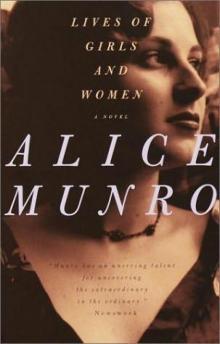 Lives of Girls and Women
Lives of Girls and Women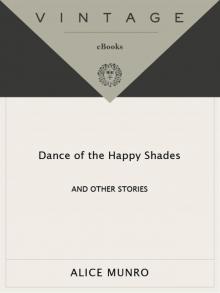 Dance of the Happy Shades
Dance of the Happy Shades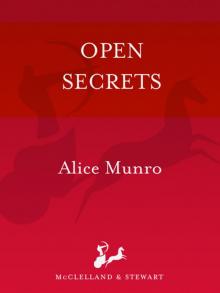 Open Secrets
Open Secrets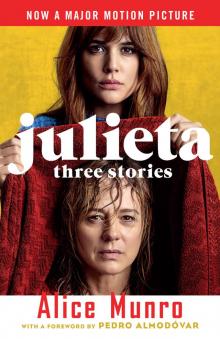 Julieta (Movie Tie-in Edition)
Julieta (Movie Tie-in Edition)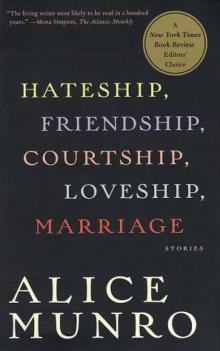 Hateship, Friendship, Courtship, Loveship, Marriage: Stories
Hateship, Friendship, Courtship, Loveship, Marriage: Stories Alice Munro's Best
Alice Munro's Best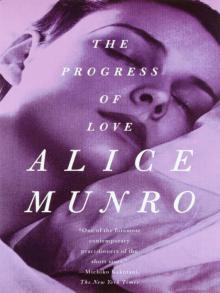 The Progress of Love
The Progress of Love Selected Stories
Selected Stories Away from Her
Away from Her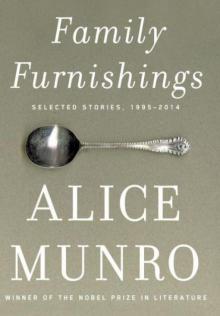 Family Furnishings
Family Furnishings Moons of Jupiter
Moons of Jupiter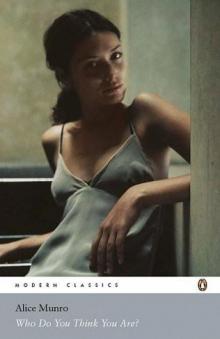 Who Do You Think You Are?
Who Do You Think You Are?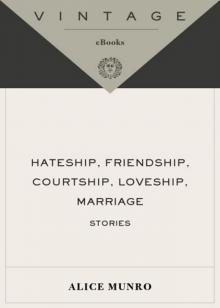 Hateship, Friendship, Courtship, Loveship, Marriage
Hateship, Friendship, Courtship, Loveship, Marriage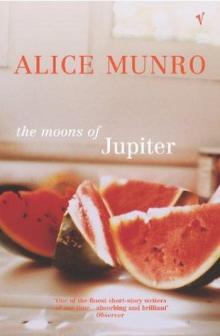 The Moons of Jupiter
The Moons of Jupiter Vintage Munro
Vintage Munro The Love of a Good Woman
The Love of a Good Woman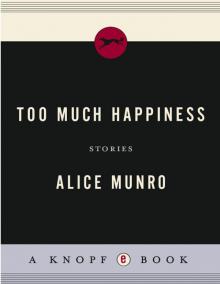 Too Much Happiness
Too Much Happiness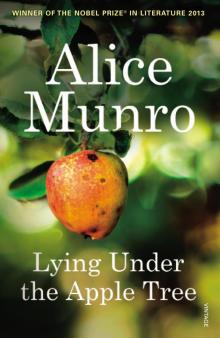 Lying Under the Apple Tree
Lying Under the Apple Tree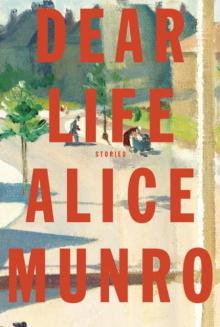 Dear Life
Dear Life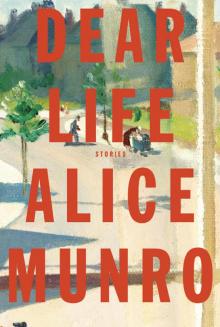 Dear Life: Stories
Dear Life: Stories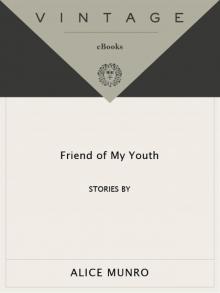 Friend of My Youth
Friend of My Youth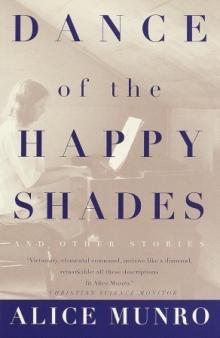 Dance of the Happy Shades: And Other Stories
Dance of the Happy Shades: And Other Stories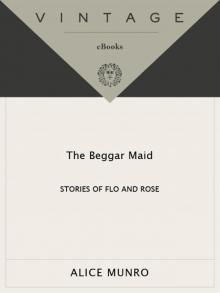 The Beggar Maid
The Beggar Maid